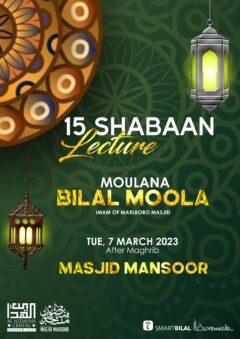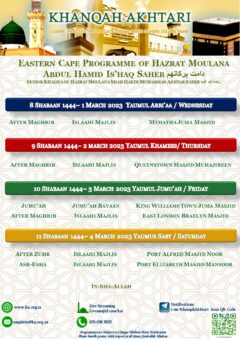One of Allah Ta’ala’s qualities is that He is Al Wahhab, the One who gives in abundance. Hibah in Arabic refers to making someone the owner of an item without taking anything in return. No one else besides Allah Ta’ala can truly give a gift because there are two fundamentals attached to gifts: 1. To make someone the owner, 2. Not to take anything in return. These are impossible for a human being. Firstly,we do not own anything in reality. Everything we have is a trust given to us by Allah Ta’ala for a limited time. Secondly, we do things based on the benefit we get in return, whether worldly or for the Hereafter. You might want love, which is not a bad motive, or praise, or you would anticipate a reward from Allah Ta’ala, or His Love, or to emulate the Sunnah. There is always an underlying motive. Allah Ta’ala on the other hand is independent of any reward.
Our giving of gifts is also limited in application. We can’t bring people into existence, grant cure to the ill, grant people children, give guidance to belief in Allah Ta’ala, etc. If you try to list the favours of Allah Ta’ala, whether financial, or a skill, or a talent, you would not be able to list them all. (Noble Quran) “Whatever blessing you have is actually from Allah Ta’ala.” (Noble Quran) Al Wahhab, Allah Ta’ala, showers bounties on all without us even being worthy of them. This is only through His favour and kindness.
Allamah Khattabi rahimahullah explains the difference between our gifts and the giving of Allah Ta’ala:
- His gifts are of different types.
- His gifts are never exhausted. Billions of people have benefitted from these and will continue to benefit from them in Paradise.
- He does not take a recompense for His gifts. When we reflect on this quality of Allah Ta’ala, it becomes a means of solace and comfort especially when we lose someone close to us, whether a child, or parent, or spouse. We understand that they were a gift from Allah Ta’ala, that He takes it away when He wishes, and we should be grateful that He allowed us to know and love that individual. More than that, He will return these gifts to us in Paradise in a far better form, “Those who believe and their children follow them in belief, We will join them with their children.” (Noble Quran) We will enjoy the company for eternity of all the family members we loved and lost, with a guarantee of never losing them again.
What is the difference between charity and giving a gift?
- The primary motive in charity is to gain reward, and the secondary motive is to make someone happy.
- The primary motive in giving a gift is to make someone happy, and the secondary motive is to gain reward. (Faidh al Baari)
Giving gifts is a Sunnah encouraged by the Prophet sallallahu alaihi wa sallam.
- The Prophet sallallahu alaihi wa sallam used to accept gifts and would give gifts in return. (Bukhari)
- Give each other gifts, you will love one another. (Bukhari)
- Giving gifts to family members cements the love and bond, “Confer gifts mutually. It enhances love and destroys malice.” (Tirmidhi) Joining family ties, while using gifts to do this, results in the added benefit of gaining more sustenance and a long life: “Whoever desires expansion in his sustenance and a prolonged life, should treat his relatives with kindness.” (Bukhari)
- One of the easy gifts to give, as well as being a tried and tested method of increase in wealth, is to gift food: “Give and receive gifts of food; your sustenance will be increased through it.” (Jaami al Sagheer)
- “When you cook gravy, increase the water and share your food with your neighbours.” (Adab al Mufrad)
Some rules regarding gifts:
- Observe equality when giving gifts to your children while you are alive. (Bukhari) When you pass away, then the inheritance shares as detailed in the Noble Quran will apply.
- Never take back a gift. “The person who takes back his gift is like a dog that vomits and then licks up its vomit.” (Bukhari)
- You can also give a gift once you die. This is in the form of a bequest which is limited to not more than one third of your net estate after payment of debts. The bequest can only be made for an individual who will not be inheriting from you. It can also be made to an organization or anyone else you wish for.
Some gifts given to the Prophet sallallahu alaihi wa sallam:
- A bed. Asad ibn Zurrah radhiallahu anhu gifted a teak wood bed to him because the people of Makkah Mukarramah were fond of sleeping on beds. The Prophet sallallahu alaihi wa sallam used it till the end of his life.
- The king of Abyssinia gave him perfume.
- The ruler of Egypt gifted him a mirror, comb and a glass vessel.
Kings would exchange gifts through history. In the eight century Harun al Rashid, the Umayyad Caliph gave an elephant to Charlemagne, King of the Franks, along with a water clock. This clock had 12 metal balls that chimed the hour and 12 figurines that paraded after emerging from small windows. It is worth noting that Muslims were at the cutting edge of innovation and invention well before the Renaissance. An interesting read in this regard is the Banu Musa brothers. They were three creative scientists who worked in the fields of mathematics, astronomy, and mechanics. They wrote the Kitab al Hiyal (Book of Ingenious Devices). They aimed to simplify people’s lives by creating useful and practical devices while adding some fun elements. This resulted in items such as the Haunted Bottle and the Moody Jug.
How do you repay gifts?
- Do something similar in return. “If somebody does an act pf kindness to you, repay it with a similar act of kindness. If you are incapable of doing so, make Dua for that person.” (Majma)
- Recite the Dua: Jazakallah khair for someone who gave you a gift. By doing so, you will exceed the requirements of praising and thanking the one who gave you the gift. (Targheeb)
- Hazrat Aeysha radhiallahu anha said that if you are unable to repay the kind gesture, then publicize the kindness of that individual to others. This is a form of expressing gratitude. Do take the person’s nature into account; some people are not comfortable with their good being known.
In summary:
- Giving gifts is a beautiful Sunnah which brings tremendous benefits in this world and the Hereafter.
- Appreciate the gifts that Allah Ta’ala has given us for whatever amount of time He deems appropriate.
- Contemplate on and internalize the quality of Allah Ta’ala being Al Wahhab (the only One who truly gives) and it will provide a means of comfort on the loss of a gift. It will also enhance the gratefulness we ought to experience when we get a gift.











COMMENTS